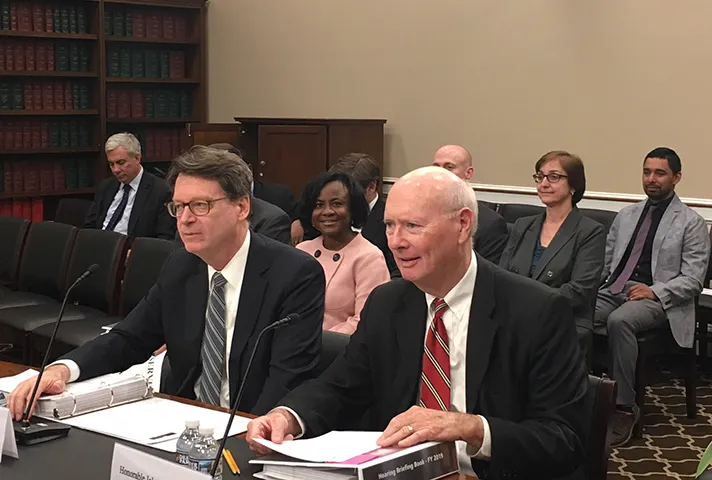
Director James C. Duff and Judge John W. Lungstrum at the Congressional hearing on the Judiciary's fiscal year 2019 budget request.
Representatives of the federal Judiciary today asked Congress to provide $7.22 billion in fiscal year 2019 to fund continuing operations of the judicial branch. The request includes funding to sustain cybersecurity initiatives and ensure sufficient security at federal courthouses.
“We ask that you consider the Judiciary’s unique constitutional role in our system of government,” said Judge John W. Lungstrum, chair of the Judicial Conference Committee on the Budget. “In return, we commit to you that we will continue to be good fiscal stewards, cutting costs where possible, spending each dollar wisely, and making smart investments to achieve long-term savings.”
Lungstrum testified before the House Appropriations Subcommittee on Financial Services and General Government. He was joined by James C. Duff, director of the Administrative Office of the U.S. Courts. They presented the Judiciary’s budget request for fiscal year 2019, which starts October 1, 2018.
“I would like to acknowledge the subcommittee for its generous and consistent support of the Judiciary’s needs,” Duff said. “We hope to maintain your confidence and support through another year of successful performance of our constitutional and statutory duties and efficient stewardship of taxpayer resources through the continuation of our longstanding cost containment program.”
The fiscal year 2019 budget request reflects an overall increase of 3.2 percent to maintain current services and to fund priority initiatives.
Lungstrum said the Judiciary is requesting $95 million for cybersecurity, saying that the Judiciary has moved aggressively to upgrade IT protections since 2015 cyberattacks compromised Office of Personnel Management records. “Inevitably, Judiciary systems have and will continue to be targeted, like numerous government and commercial entities worldwide,” Lungstrum said.
The Judiciary also is seeking increases for the defender services program to handle projected caseload and other priorities; additional funding to improve courthouse security; and funding to update PACTS, a national integrated database that helps probation and pretrial services officers supervise criminal offenders and defendants under community supervision.
Lungstrum’s and Duff’s statements each highlighted Judiciary initiatives to save money.
Lungstrum said the Judiciary recently surpassed its national 3 percent space reduction goal set in 2013. To date, that initiative has saved the Judiciary $25 million in annual rent costs. When combined with new policies negotiated by the Judiciary with the General Services Administration on how GSA appraises and charges for certain types of rental space, federal courts have achieved annual rent savings of nearly $80 million.
In addition, the Judiciary has worked to cut costs by encouraging court units to share common administrative functions. “Over 90 percent of all courts report having formal or informal/temporary sharing arrangements of some kind,” he said.
Lungstrum expressed concern in written testimony that proposed cuts to non-defense federal spending in fiscal year 2019 could significantly impact the Judiciary. Such cuts “would come at a time in which the Administration intends to increase border security and law enforcement activities, which will increase our workload,” he said.
He also thanked Congress for Judiciary funding levels in the Consolidated Appropriations Act of 2018. The recently passed law, which funds the federal government for fiscal year 2018, included funding to increase the daily juror attendance fee from $40 to $50, raised hourly fees for private lawyers appointed to represent criminal defendants, and included GSA funding to build three top-priority courthouses.
Subscribe to News Updates
Subscribe to be notified when the news section is updated.
